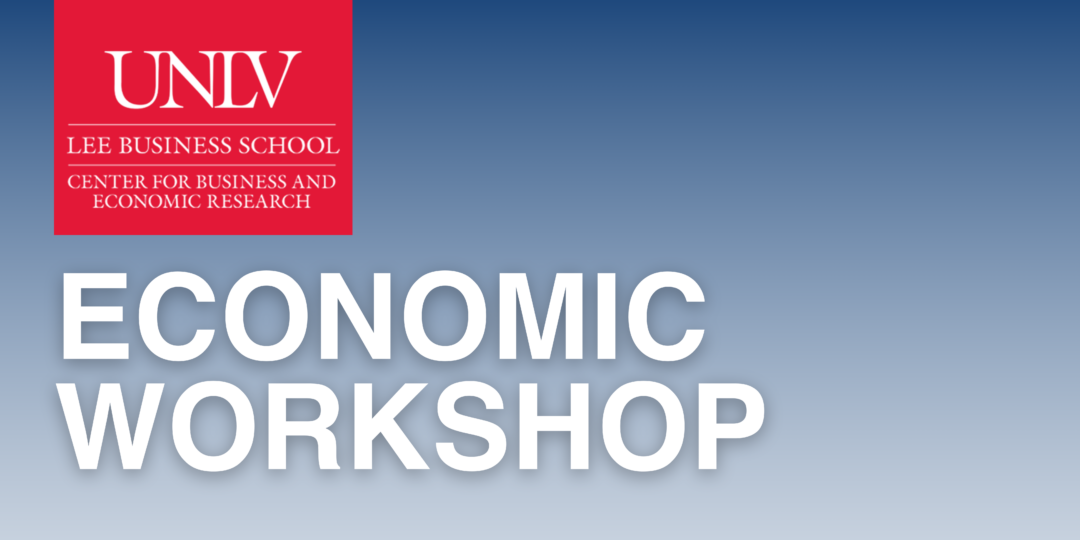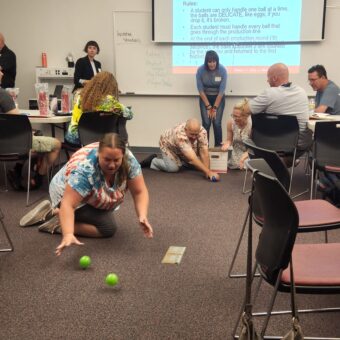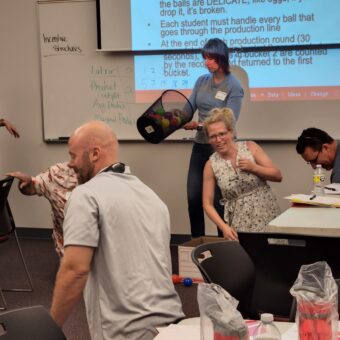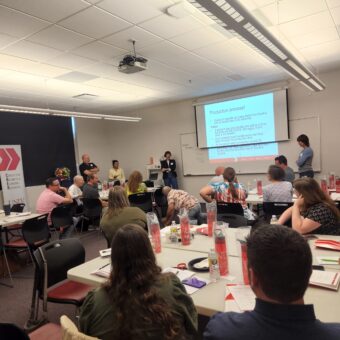The Economic Workshop will be taught by one of UNLV Department of Evonomics’s finest professors. Virtual workshop lots of content and activities to use in your classroom, and learning support from our faculty and team.
In 2017, the Nevada legislature passed SB249 that requires high schools across the state to teach one-half unit of credit of economics in combination with or without American government. The UNLV Economic Workshop will provide educators of the Clark County School System with the skills and activities to teach (or enhance their teaching of) economics in the classroom.
The course is primarily asynchronous, with online instruction videos, readings, and quizzes. There will be one Saturday morning class near the end of the course where educators will practice the concepts learned and practice the in-classroom activities, in addition the course
Workshop Description
Designed for Nevada K-12 educators, this 15-hour workshop provides an engaging and practical approach to integrating fundamental economic concepts into the classroom. With an even balance of lecture and interactive activities, participants will explore key economic principles that shape students’ understanding of the world. This course will equip teachers with the knowledge and strategies to foster economic literacy across disciplines like Social Studies, English, and STEM. By the end of this course, educators will have the tools to prepare students for real-world decision-making, financial awareness, and informed citizenship.
Course Topics & Learning Outcomes
- What is Economics? (Foundation for all other topics)
- Define economics and its role in daily life (Remember).
- Illustrate how scarcity and choice influence decision-making
(Understand). - Analyze real-world examples of economic decision-making in a
K-12 setting (Analyze).
How Do I Decide What to Do? (Opportunity Cost) (Decision making framework for students)
- Explain the concept of opportunity cost in decision-making (Understand).
Apply opportunity cost to personal and classroom-related decisions (Apply).
Justify choices based on opportunity cost in historical or fictional scenarios (Evaluate). - What is Economics? (Foundation for all other topics)
Why Should I Specialize and what Should I Specialize in? (Connecting individual decisions to economic productivity)
- Define specialization and its role in economic efficiency (Remember).
- Illustrate how specialization impacts productivity and trade (Understand).
- Develop a classroom activity to demonstrate comparative advantage (Create).
How Does Capitalism Work? (Understanding the broader economic system)
- Describe the fundamental characteristics of capitalism (Remember).
- Compare capitalism to other economic systems (Understand).
- Debate the benefits and challenges of capitalism using case studies (Evaluate).
Consumption and Demand: Why Do We Buy What We Buy? (Tying individual behavior to market forces)
- Define the law of demand and factors influencing consumer choices (Remember).
- Examine how marketing, trends, and psychology shape consumer demand (Analyze).
Marginal Utility: How Much is Enough? (Exploring consumer choices in depth)
- Define marginal utility and diminishing returns (Remember).
- Predict how consumer behavior changes based on marginal utility (Analyze).
- Conduct a classroom experiment to demonstrate diminishing marginal utility (Create).
How Do We Measure Wealth? GDP, Inflation, and Economic Growth (Evaluating economic performance and its impact on individuals and societies)
- Describe key economic indicators such as GDP, inflation, and unemployment (Remember).
- Interpret real-world economic data to assess economic health (Analyze).
- Debate different perspectives on economic growth and sustainability (Evaluate).
How Do Tariffs Work? (Connecting national economies to global trade and policies)
- Explain the purpose and function of tariffs in trade (Understand).
- Assess how tariffs impact businesses, consumers, and governments (Analyze).
- Construct an argument for or against a real-world tariff policy (Evaluate).
Who Should Take This Course?
This Workshop is ideal for Nevada K-12 teachers in Social Studies, English, and related disciplines who want to make economic concepts relevant and engaging for students. Whether you teach history, government, personal finance, or media literacy, this course will provide practical strategies to enhance economic discussions related to your content areas in your classroom.
In partnership with Nevada Association of School Administrators (NASA)
ALL are welcome, including anyone in a non-administrative position! NASA IS NOT A UNION. NASA is Nevada’s PreK-12 Professional Development Organization for ALL Nevada Educators!
Participants will earn 1 credit (15 hours) toward license renewal!
This workshop ALSO counts for step advancement for licensed personnel in Clark and most Nevada School Districts!
Check to see if this workshop applies to your area of license.
In CCSD, those in non-administrative licensed positions may count this workshop for license renewal AND ALSO 5 CUs – THOSE IN NON-ADMINISTRATIVE POSITIONS EARN BOTH!
Check to see if this workshop applies to your area of license.
In CCSD, administrators and professional-technical administrators may count this workshop for license renewal OR 5 hours toward step-advancement – not both for administrators.
All participants earn license renewal credit by taking this event!
Washoe County participants may receive salary advancement- please look in MyPGS 1-2 weeks after NASA posts this offering to see if inservice credits are offered. If so, Washoe County School District (WCSD) participants are required to register in MyPGS and submit an artifact (which will be specified) on how they will implement this professional learning to increase student achievement before a certificate is issued.
Upcoming Cohort
Start: May 5, 2025
End: May 9 2025
Time: 4:30 – 7:30 pm (Virtually)
Cost:
$100 for NASA Members
$150 for Non-NASA Members
This program is made possible by support from the UNLV Center for Business and Economic Research and the Engelstad Foundation.
Photo Gallery
Hear from one of Nevada’s local teachers about the Economic Micro-Credential Cohort:



